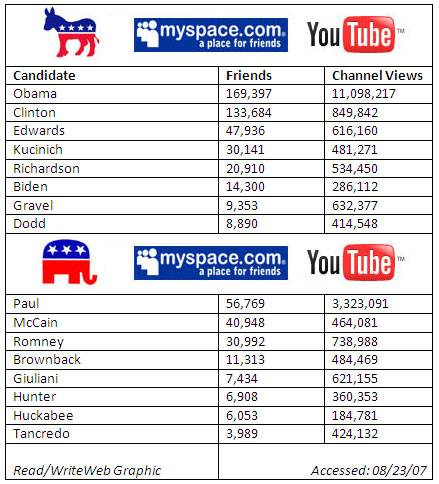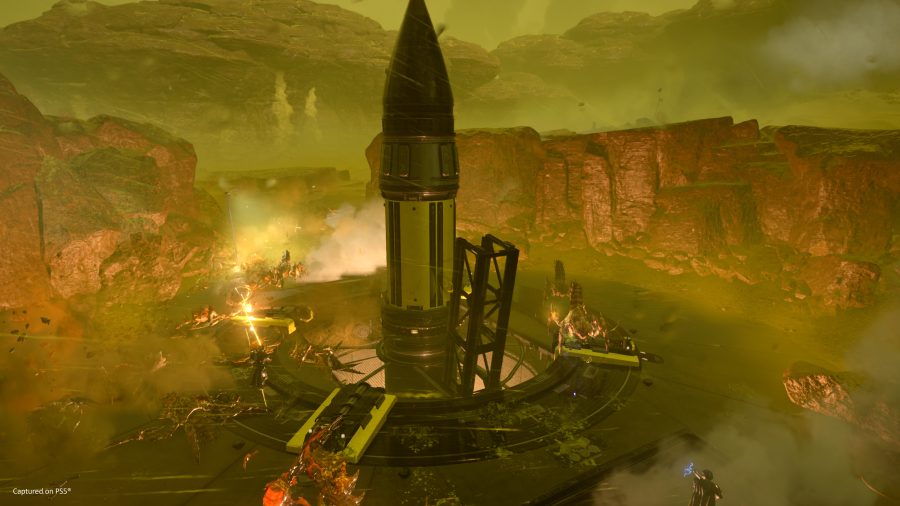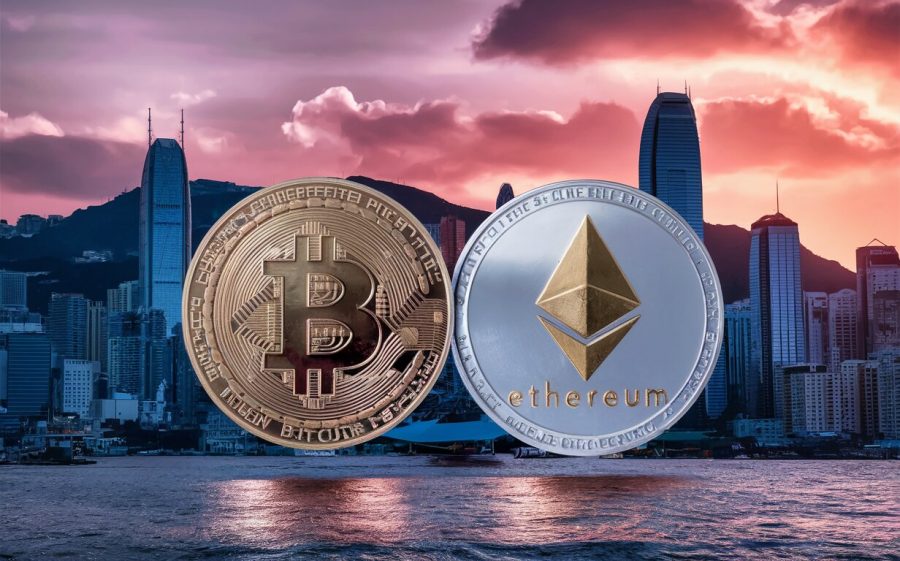“Lecterns are so 2004,” says AP writer Jake Coyle. Not wanting to feel left out after all the CNN-YouTube debate hoopla, MySpace and MTV announced a series of one-on-one “candidate forums” yesterday. Rather than a debate format, candidates will appear individually to answer questions submitted by MySpace users specifically for them. “We very much want to take the Iowa or New Hampshire living room global,” said GM of MySpaceTV, Jeff Berman, referring to the informal, small group meetings candidates often hold in those early primary states.

Much has been made of the web’s increased role in these latest US presidential elections. But does it really matter? In 2004, there was a lot of attention given to Howard Dean’s power house, grassroots Internet-fueled primary campaign — he flamed out and was a footnote by February. Success on the web did not translate to success at the polls in Dean’s case, and there is evidence that history may be repeating. So just what might it look like if web 2.0 picked the president?
In June, I wrote that “by creating platforms for candidates and talking directly to the people, Google has positioned themselves as a major force in shaping American political policy (and by extension, have a far reaching global effect).” I argued that Google, through YouTube especially, has given candidates an extremely cost-effective way to reach millions of potential voters. The same has been said for MySpace, Facebook, and other social networks.
But predicting the next US election based on Internet popularity might be a big mistake. There appears to be a growing disconnect in what the Internet might suggest vs. the picture that polling data paints. Judging by MySpace friends and YouTube channel views, America is preparing for a showdown of Barack Obama (Democrat) and Ron Paul (Republican). Obama’s 169,000 MySpace friends are the most of any candidate, and his 11 million YouTube channel views place him laughably ahead of the competition. Hillary Clinton’s 849,000 channel views is the next closest on YouTube amongst Democratic contenders (her 133,000 MySpace friends presents a closer gap, though). On the Republican side, Ron Paul has 56,000 MySpace friends — about 40% more than the next closest candidate, and his 3.3 million YouTube views make him the only other presidential candidate to pass the million mark.

But all of the latest polling data concludes that neither Paul nor Obama are the presumptive nominees for their respective parties. Every poll conducted this month, from Quinnipiac, to USA Today, to CNN gives Clinton a commanding 15 to 24 point lead over Obama. On the Republican side, things are even more muddled. Paul barely registers on most polls, coming in around 1%, while Rudy Giuliani is way out in front. According to MySpace, Giuliani is 5th. YouTube puts him 3rd.
Why the Disconnect?
I think there are probably three potential reasons for the major discrepancy between what web 2.0 anecdotally tells us about the 2008 US election, and what hard polling data actually suggests. The first is age. Though youth turnout surged in the 2004 election, older voters still made up the majority at the polls. Of the 125 million or so votes cast, only 20.9 million were from Americans under 30. Because sites like MySpace and YouTube skew younger (and I mean under 50, not under 35), it could be that a lot of the action candidates see on those sites is from people who aren’t likely to actually cast a vote.
The second reason is the cool factor. The candidate du jour you want to buddy up to online isn’t necessarily the one people think is the best for the job. In 2004 a famous whimsical poll found that 57% of voters would rather have a beer with George Bush than challenger John Kerry. But Bush didn’t win 57% of the vote (he won 51% of the popular vote), and those that voted for him likely didn’t do so because they thought he would look better on their MySpace friends list.
The last, and least likely reason, is that the polls themselves are screwed up. Ron Paul’s campaign has alleged that his poor polling numbers are a result of pollsters under counting youth voters who only use cell phones (and have no landline for the pollsters to call). Even if this were the case, it’s unlikely that the 13% of Americans who don’t use a landline would differ in opinion from their traditional phone using brethren enough to swing the polls very much. And as I said in point one: the youth vote — who account for most of that 13% — is a small slice of the election pie.
Conclusion
None of this, however, means that the web doesn’t matter in politics. Far from it. I still think that the Internet is an important way for candidates to spread their message and connect with voters. Where else but YouTube could Barack Obama get his message out 11 million times for free? There’s also no question that the Internet has been a very successful fundraising vehicle for many of these candidates. In the first quarter of this year, Obama’s Internet popularity led directly to $6.9 million, compared to Clinton’s $4.2 million raised online.
The CNN/YouTube debates and the upcoming MTV/MySpace candidate’s forums have been (and presumably will be) great ways for voters to genuinely connect with candidates on issues that matter to them. I believe this form of user generated politics can only be good for the political process in the long run.
Of course, I think it’s clear that we shouldn’t look at web popularity to predict election outcomes. But no one was really doing that, right? Right?










